UPDATE (March 13, 2013): In a chaotic scene this morning, rival press conferences announced that San Francisco Symphony musicians have gone on strike, effective immediately, cancelling tomorrow's concert of Mahler's Symphony No. 9.
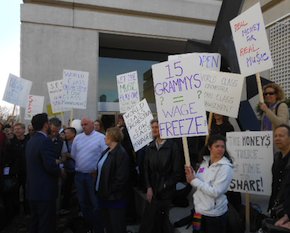
As SFS musicians gathered for a 10 a.m. rehearsal today, they took a vote, walked out, and declared a strike. Orchestra spokesman David Gaudry, speaking before a large group of media gathered outside the hall said that there is no offer from management that they can consider and so they have declared a strike.
Inside the hall, Executive Director Brent Assink told the hastily called media that the Symphony is "deeply disappointed that the musicians have chosen to strike, and deeply regret any inconvenience to patrons. Saying that he is "an irrational optimist," Assink expressed hope that the dispute will soon be settled, but reiterated that the organization must follow "a prudent financial course." Both sides confirmed that the current pay offer is for wage freeze in the first year, and 1% increase of base salary for the following two years, raising today's $141,700 base salary to $144,560 by 2015.
Musicians have gathered around Davies Symphony Hall, waving placard with their demands to passing cars.
Suddenly and ominously, the threat of a musicians' strike is looming over the San Francisco Symphony. Suddenly, that is, for the general public, which rarely hears about contract talks until they reach an impasse.
For the SFS management and the orchestra, represented by Musicians Union Local 6, it's been a daily topic since the old contract ran out last year, on Nov. 24, and was then extended through Feb. 15, 2013. Negotiations began eight months ago.
On Thursday, the orchestra voted unanimously "to authorize a strike if contract negotiations with management continue to stall." The musicians set next week as deadline, in advance of the scheduled SFS East Coast tour, March 20-23. The next, pivotal, negotiating session is scheduled for March 12, with the participation of a federal mediator.
The orchestra's last strike took place in 1997. It was a work stoppage extending over nine weeks, forcing the cancellation of 48 concerts, and costing musicians, the organization, Hayes Valley businesses, and the whole city millions of dollars. Even at the end of the bitter dispute, member ratification received a relatively close majority of 54-41.
Peace and prosperity have reigned ever since, SFS doing extraordinarily well, even during days of the Great Recession, which weakened or shot down many other orchestras. Besides winning awards, filling Davies Symphony Hall regularly, and receiving accolades on Asian and European tours, the Symphony has also built one of the country's biggest endowments, its current market value estimated by management at $239 million (and at $272 million by the musicians).
(For comparison, Boston Symphony has the largest endowment, showing $387.3 million in the 2011 tax return; New York Philharmonic ($195.5m) and Los Angeles Philharmonic ($137.6m) are way behind.)
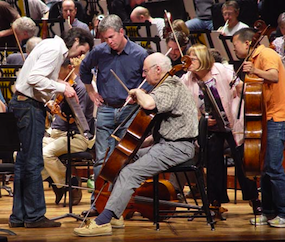
The most recent audited SFS operating budget was for the 2011-2012 centennial season: $79.2 million, with a deficit of $844,000.
The Symphony currently employs 103 musicians, three librarians, 30 part-time chorus members, 29 part-time ushers, and 130 full-time administrative staff. The Musicians Union covers only orchestra musicians.
Ironically, it is exactly the Symphony's robust financial health that is a main issue for the musicians, who feel they are not getting their fair share. The Players' Committee, announcing the strike authorization, stated:
Management is seeking freezes in musicians' wages and pension, and cuts in medical benefits, while the musicians have proposed an agreement that will maintain the excellence of the Symphony and help to compete directly with their higher-paid peers in Chicago and Los Angeles ... Management has awarded itself significant raises and is pursuing a building expansion at a cost of more than half-a-billion dollars ...In the 10-year period from 2001 through calendar year 2011 top symphony leadership received salary increases in amounts substantially greater than the increases provided for musicians. The salary for the Executive Director Brent Assink increased by 79% — over 50% more than the increases for the musicians over the same timeframe. According to the latest IRS 990 forms, in 2010, the Music Director [Michael Tilson Thomas] was paid $2.4 million, 18.5 times more than the guaranteed base pay for musicians.
SFS increased its budget by almost $11 million last year for the centennial celebration party [actually, for the season]. The improvements that the musicians are seeking in the next contract will cost less than the Centennial Celebration cost.
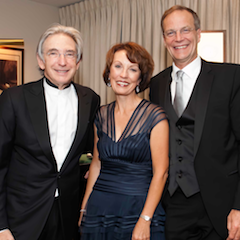
"The members of the orchestra are fed up and willing to do whatever it takes to get a better contract," said violist Dave Gaudry, chair of the musicians' negotiating committee. "The current management proposal calls for a wage freeze in the first year, raises of 1% in the second year, 1% in the third year. Their proposal calls for reductions in health care of close to $2 million. We take issue with the management awarding themselves raises of 4.5% to 9.5%, or in Assink's case, about $280,000 in bonus over two years, while attempting net reductions in orchestra compensation.
Assink's initial response to news of the strike vote was:
Our musicians are the center of our organization and are among the most talented in the world. We are working with the union representing the musicians and a federal mediator to develop a fair agreement that recognizes the musicians' stature as one of the top orchestras in the country, but one that does not compromise the future artistic quality or financial stability of the institution.
The administration states that musicians' average annual salary is over $165,000:
In addition to a minimum annual base pay of $141,700, musicians also receive radio payments [for broadcasts], over-scale, seniority and other added compensation that makes their average annual pay over $165K.Musicians receive 10 weeks paid vacation, paid sick leave, a full coverage health care plan with no monthly contribution for individuals, and a maximum annual pension payment of $74,000 upon retirement. In the past four years, SFS musicians have received salary increases of 17.3% (4.3% average increase per year).
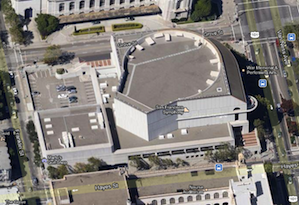
The musicians' response:
The base salary is $141,700. Musicians are paid $2,725 per week, which is the minimum weekly scale. There is some contractual overscale for Principal, Associate Principal and Assistant Principal positions. Our bargaining unit doesn’t receive bonuses, unlike the Executive Director who received a 34% bonus/compensation increase in 2011/12.The four-year agreement began in November 2008 at $2,400 per week so the increase was 3.38% per year since the date of the current contract. Musicians must contribute to the health plan if they have spouses or family members.
Drew McManus' blog Adaptistration reports a 2012 compensation figure of $495,044 for Assink on an operating budget of $71.6 million, and says that among the country's symphony executive directors/CEOs, Los Angeles Philharmonic's Deborah Borda receives $1.4m on an operating budget of $97m; Michael Henson of the deeply troubled Minnesota Orchestra, where currently musicians are locked out, the season suspended, receives $404,049 on a budget of $31.6m; Zarin Mehta, Matthew VanBesien's predecessor at the New York Philharmonic, received $860,210 in 2010 on a budget of $77.3m.
The union reference to "a building expansion at a cost of more than a half-billion dollars" broaches a complex story, which may persist long after the current compensation dispute is settled. The shorthand is "Lake Louise" for the parking lot on the corner of Franklin and Grove streets, flanking the Louise M. Davies Symphony Hall, the full name honoring the later benefactor, whose donation was essential to the building of the hall.
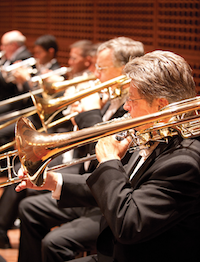
Using that space as an extension or addition to Davies Hall has been under consideration ever since the hall went up in 1980. A decade ago, SFCV founding publisher Robert Commanday wrote:
For the better proportioned yet still top standard opera experience to develop in San Francisco, the proper venue must be created, a theater seating from 800 to 1,000 with an orchestra pit and theater house, fly gallery and ample wings. There is a space and solution that beckon, a theater built on the parking area next to Davies Hall, the so-called "Lake Louise." It would extend into and incorporate the existing but under-utilized Zellerbach Rehearsal facility, with its stage and associated facilities ready today and waiting.
A SF Symphony spokesman says now:
The SFS Board of Governors has, for a long time, been thinking about what might be needed to prepare the orchestra for its second century and best serve the next generation of artists and audiences. This includes identifying and growing new artistic programs and sources of revenue.Our hall was built in 1980. At this time, the organization is only in exploratory discussions about what better serving our musicians and audiences would include, in terms of potential expanded facilities for its home of Davies Symphony Hall. SFS musicians have been invited to and have participated in these discussions, which are only in the exploratory phase.
The musicians' spokesman insists on the accuracy of their estimate, saying that "one of the members on my committee was on a study group with management and board about the building project, our information on the cost of the project came first-hand through him."
David Gaudry, speaking for the orchestra, told SFCV:
The musicians are in fact supportive of the notion to improve and upgrade the physical environment in which we work and perform, there are many elegant and exciting ideas on the table, and we're thrilled there are the abundant financial resources to bring this about.On the other hand, to propose a musicians' contract that is so regressive it will undercut recruitment and lead to more musician-defections to better paid orchestras, while such building plans are in the works, tells us the management of the SFS has completely lost its way.
